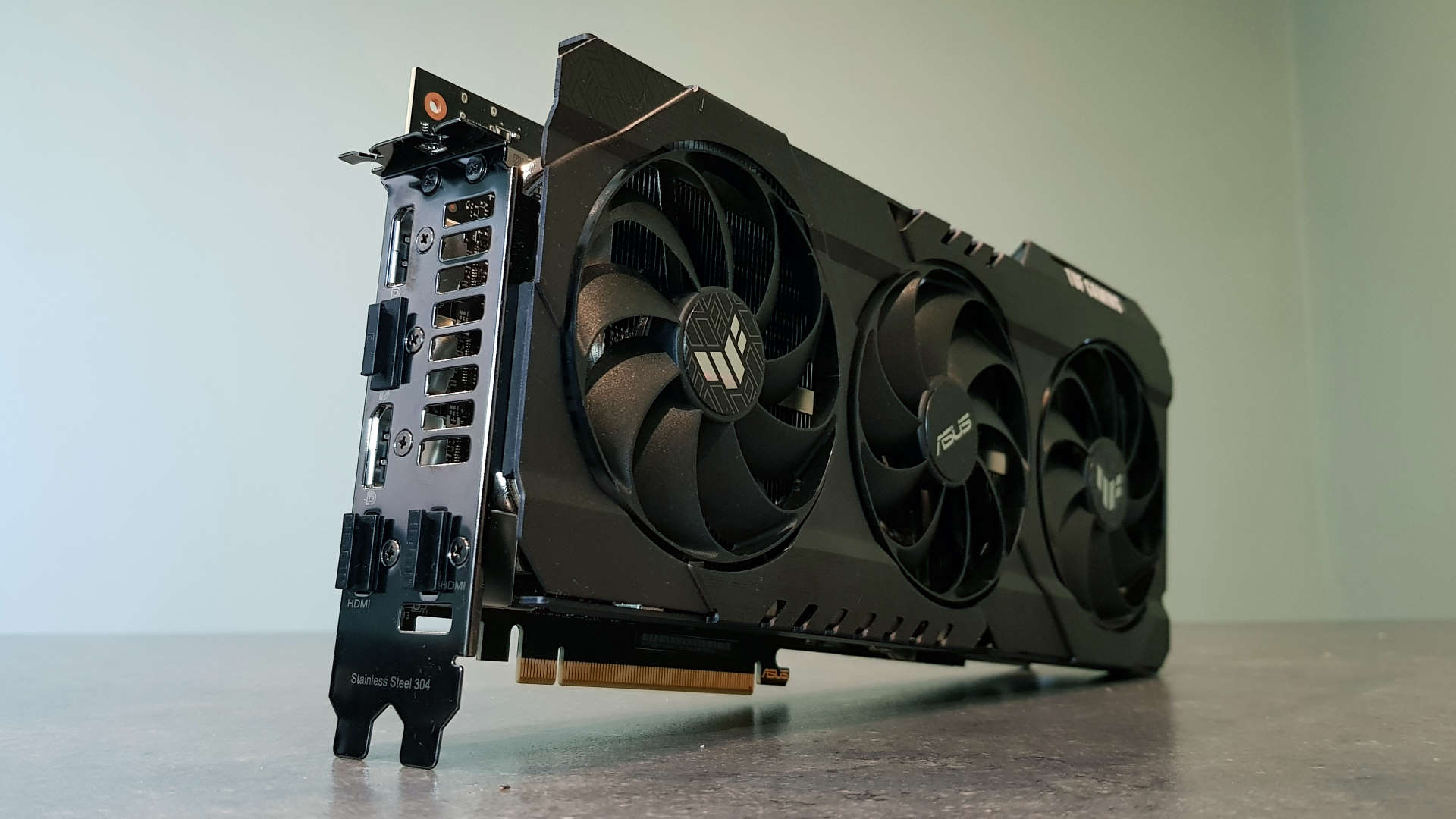Our Verdict
The Asus RTX 3080 is a great card, because the reference RTX 3080 is a great card, but also because of its stellar cooling design. Just that factory OC premium doesn't buy you much besides.
For
- Excellent cooler
- RTX 3080 gaming performance
Against
- Little factory overclock gains
- Power hungry
PC Gamer's got your back
The Asus TUF Gaming RTX 3080 OC, as the name might suggest, is the first factory overclocked version of Nvidia's new GPU to pass across my test bench, but definitely not the last. And it's a bit of a monster. Not just in the way that it eats 4K gaming for breakfast, but in terms of its general scale too. The cooler is huge and the circuit board the GPU sits on is massive too—way larger than any other RTX 3080 I've seen so far.
It's big, I guess is kinda what I'm getting at.
The new Nvidia RTX 3080, in all its guises, makes for a mighty graphics card. The flagship gaming GPU of the Ampere generation represents the silicon which makes 4K gaming a genuine reality and even more than that, it truly enables real-time ray tracing without the unpalatable performance sacrifices that blighted the inaugural RTX 20-series.
And the Founders Edition of Nvidia's new GPU is pretty special in its own right but, in a departure from tradition, third party graphics card manufacturers, such as Asus, are able to ship overclocked and reference cards right on launch day. Normally you'd be waiting a month or so for a factory-overclocked card to come out, but maybe to ensure there are as many RTX 3080 cards on the virtual shelves as possible, Nvidia has loosened the reins.
That's still not been enough to ensure everyone who wants one is able to grab themselves a card, whether Founders or otherwise, and there have been dodgy Ebay resellers skimming cards and trying to shift them on for exorbitant prices. Thankfully the public, retailers, and Nvidia itself are trying "everything humanly possible" to cut down on that crap.
GPU - GA102
CUDA cores - 8,704
GPU Boost clock - 1,815MHz (OC Mode)
Memory bus - 320-bit
Memory capacity - 10GB GDDR6X
Memory speed - 19Gbps
Memory bandwidth - 760GB/s
Power connectors - 2x 8pin
Still, with cards such as the Asus TUF Gaming RTX 3080 OC nominally available at launch, there is the potential for stock to return as quickly as possible. But is an overclocked version your best bet compared to the excellent Founders Edition from Nvidia? There is only a relatively slight premium attached to the Asus TUF card, with this OC edition offering a boost clock of 1,815MHz compared with the rated 1,710MHz boost of the FE card for its $750 (£720) sticker price.
Traditionally overclocked cards don't deliver a 100MHz+ OC out of the box, which ought to make the Asus RTX 3080 a more desirable card than the reference-clocked version straight out of Nvidia's skunkworks.
Asus has also gone all out with a triple fan design, and has tuned the cooler in a new way to create less turbulence from having three large fans stuck next to each other. The central fan spins in the opposite direction, which does look kinda weird, but anecdotally seems to work. By which I mean this TUF Gaming card is easily the most chilled of the four different RTX 3080 cards I've tested so far.
I'm still Team Founders Edition when it comes to the RTX 3080
Obviously those vast heatsinks under the all-metal shroud play into that somewhat too. And it's not just about the GPU either, as there's a further discrete heatsink in there specifically to keep the 10GB of GDDR6X operating well below its max operating specs. Asus is calling the new, rugged TUF design an attempt to create an 'old faithful' graphics card, a workhorse that will just keep on truckin'.
I certainly didn't have any problems with the card, and that's not something which can be said for all the overclocked versions that have hit the test bench. And my experience overclocking the Founders Edition shows it's not easy to get a stable core when tweaking the clocks right now.
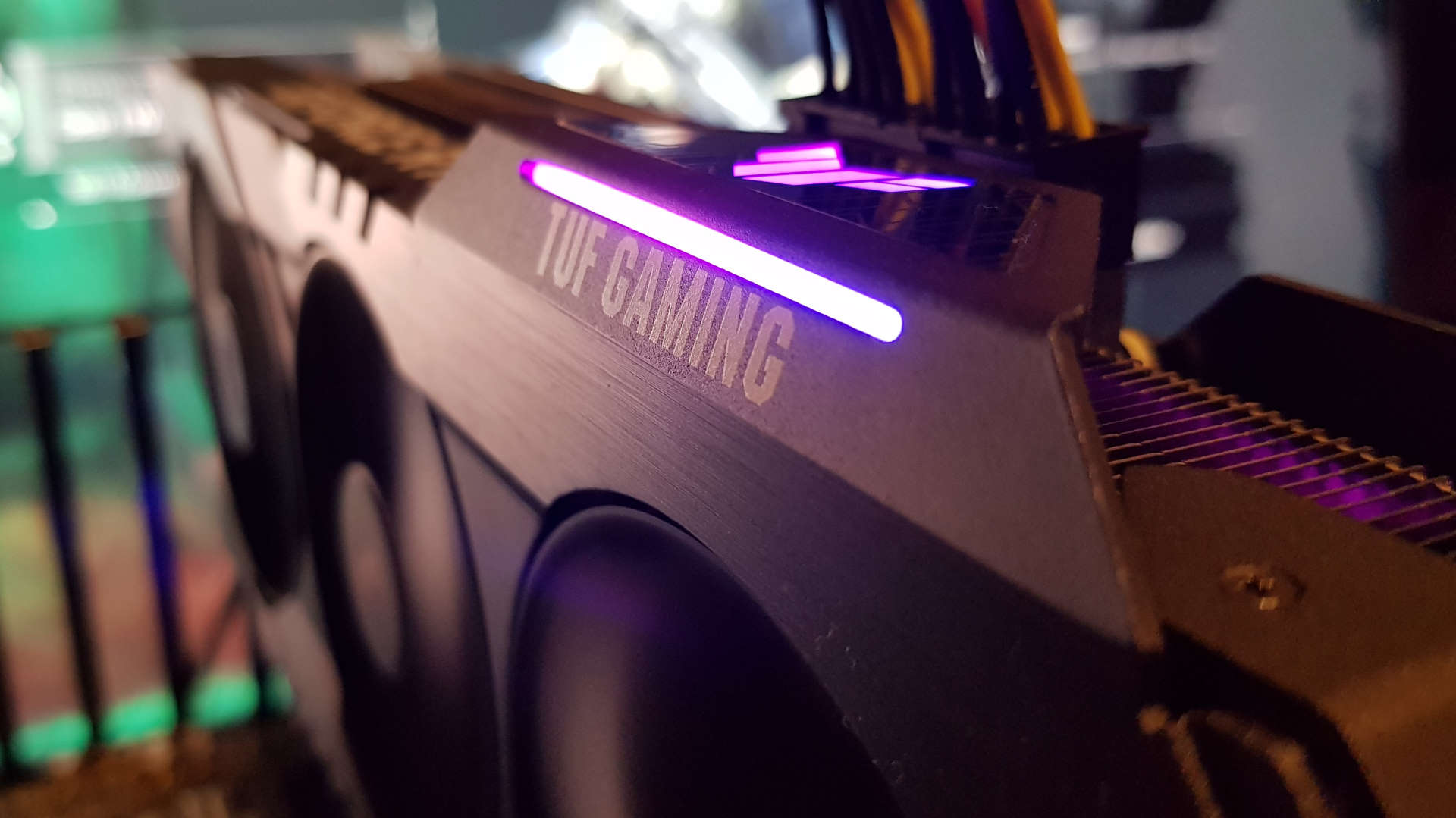
Asus TUF Gaming RTX 3080 benchmarks
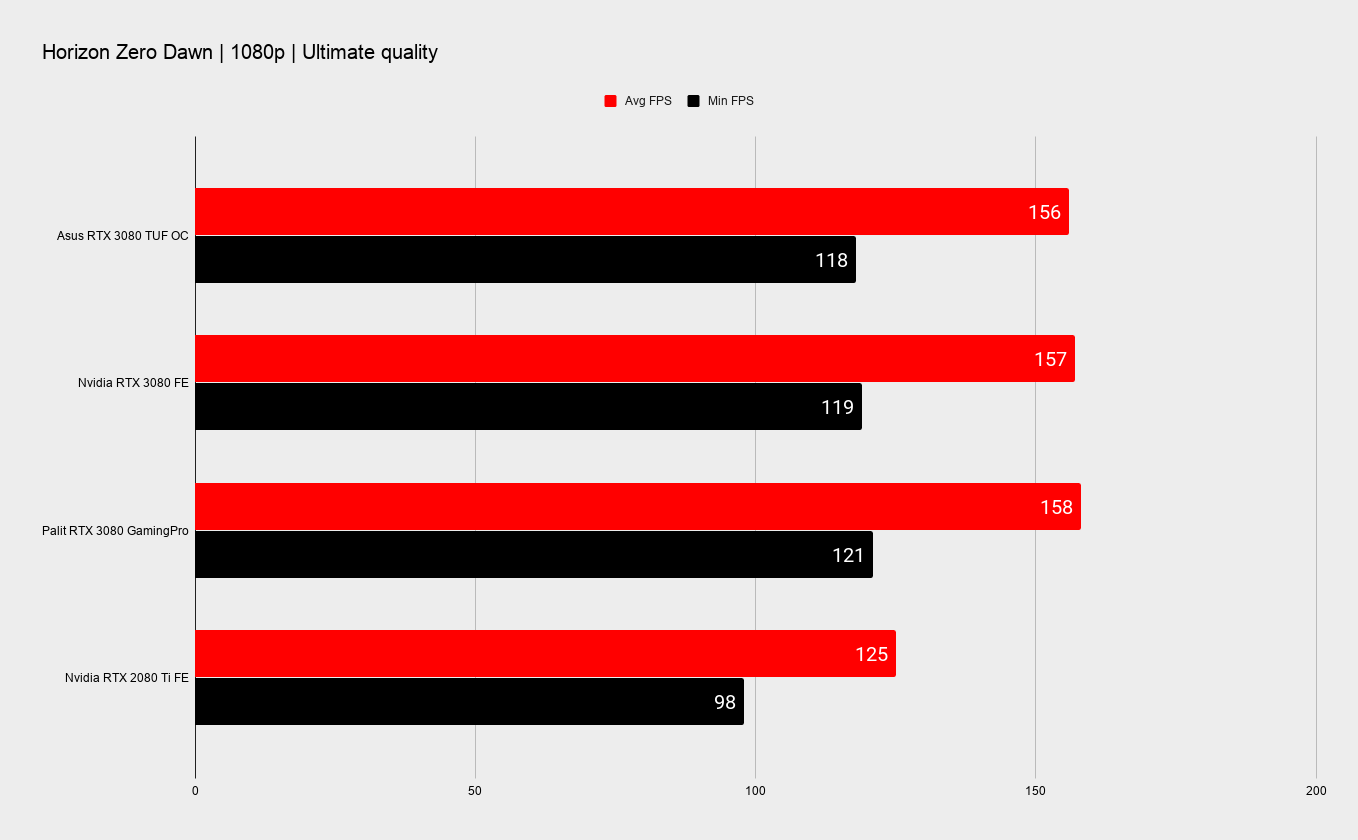
1080p gaming performance
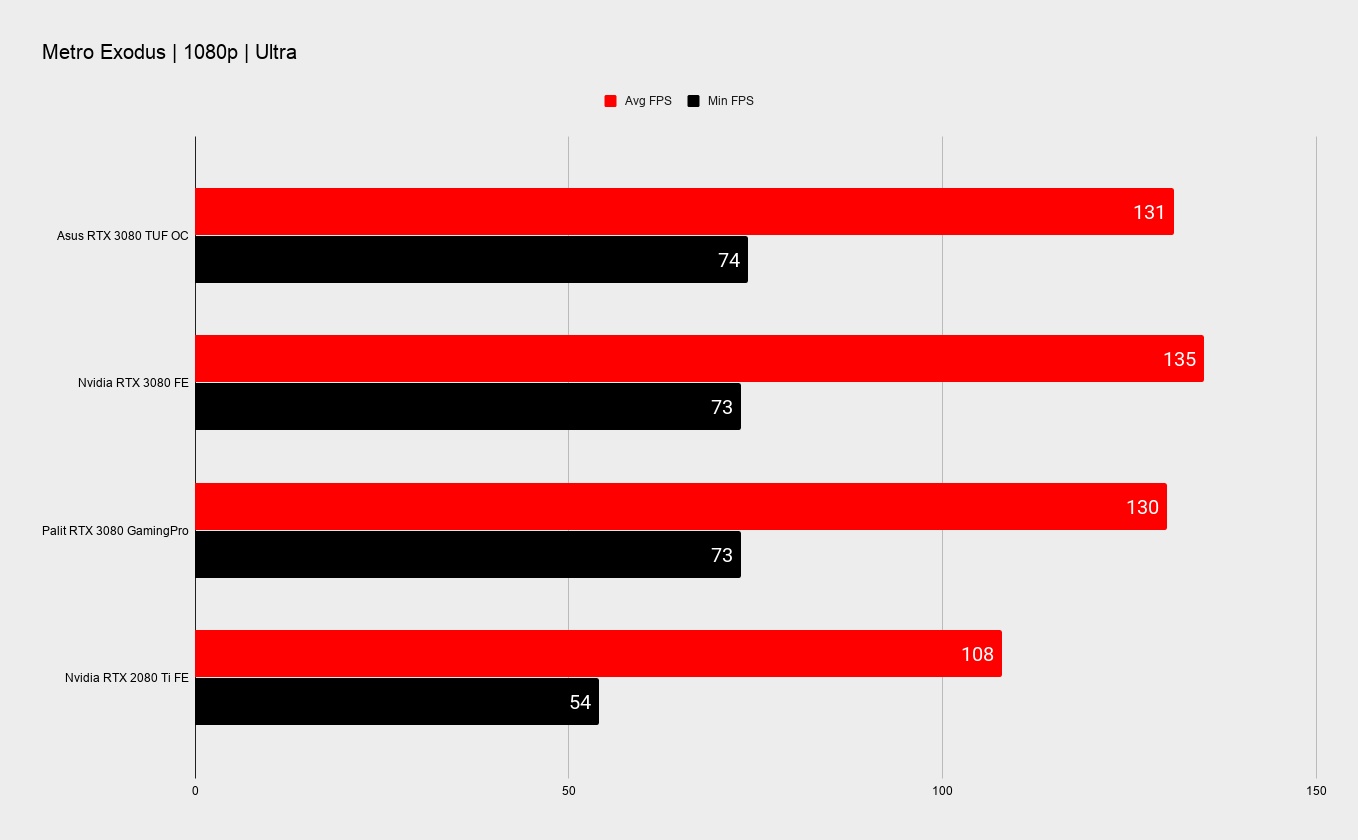
1080p gaming performance
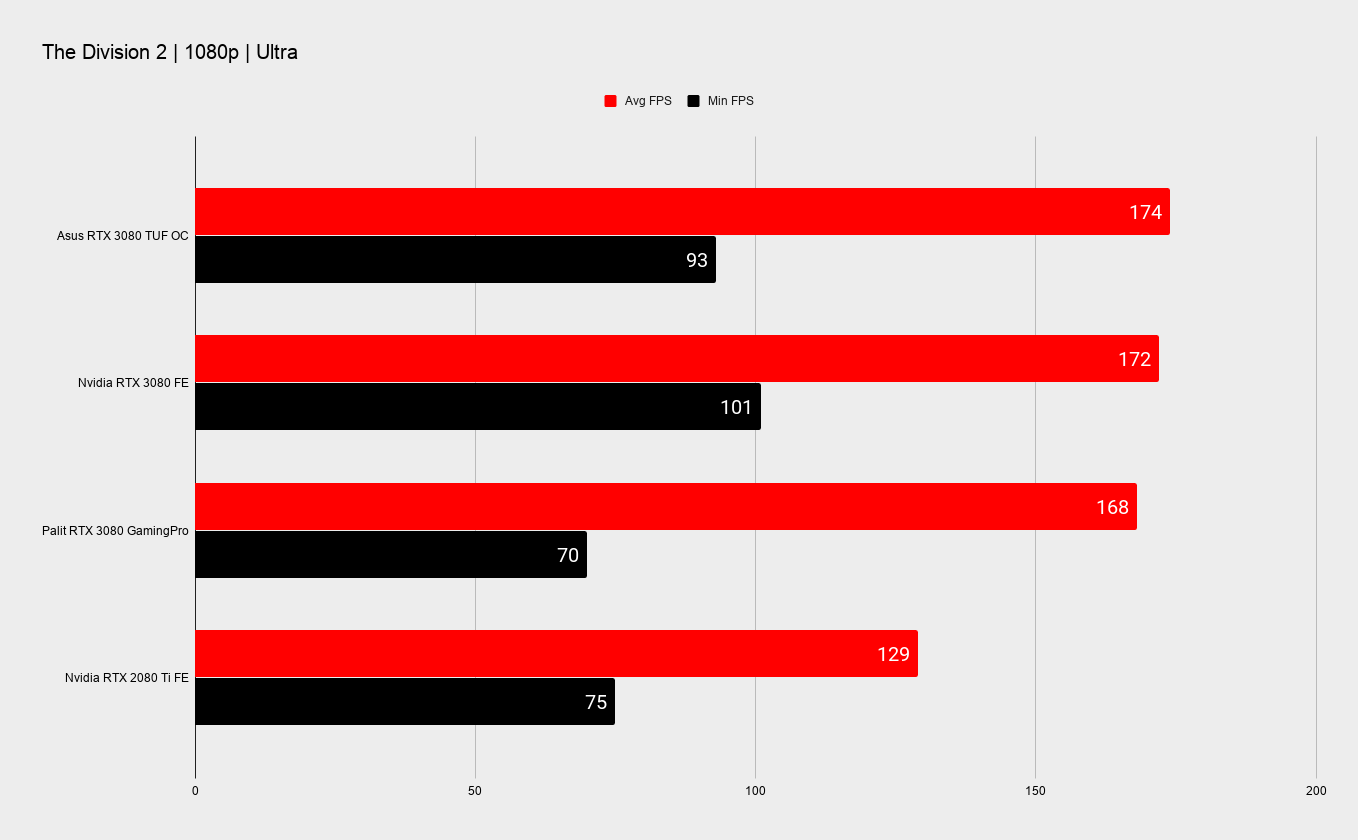
1080p gaming performance
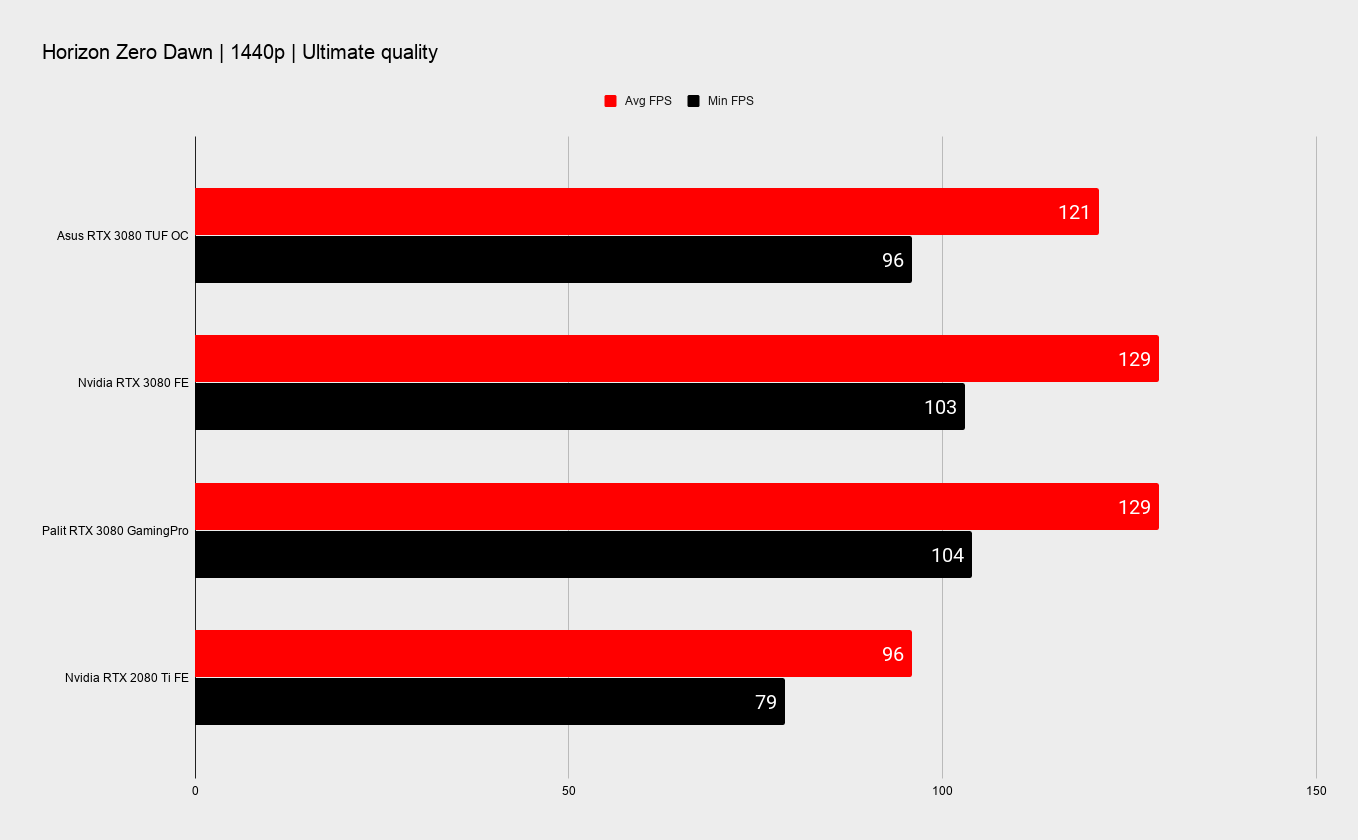
1440p gaming performance
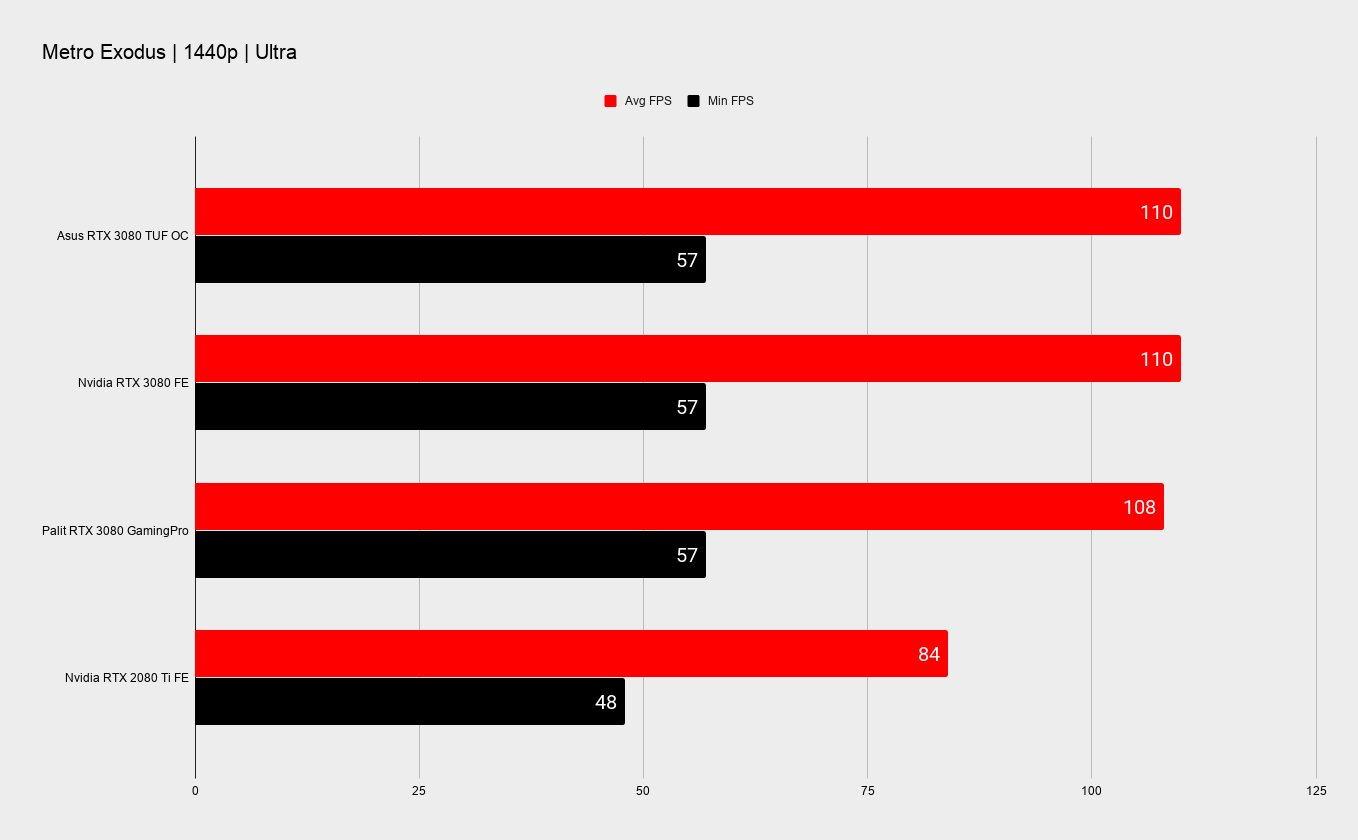
1440p gaming performance
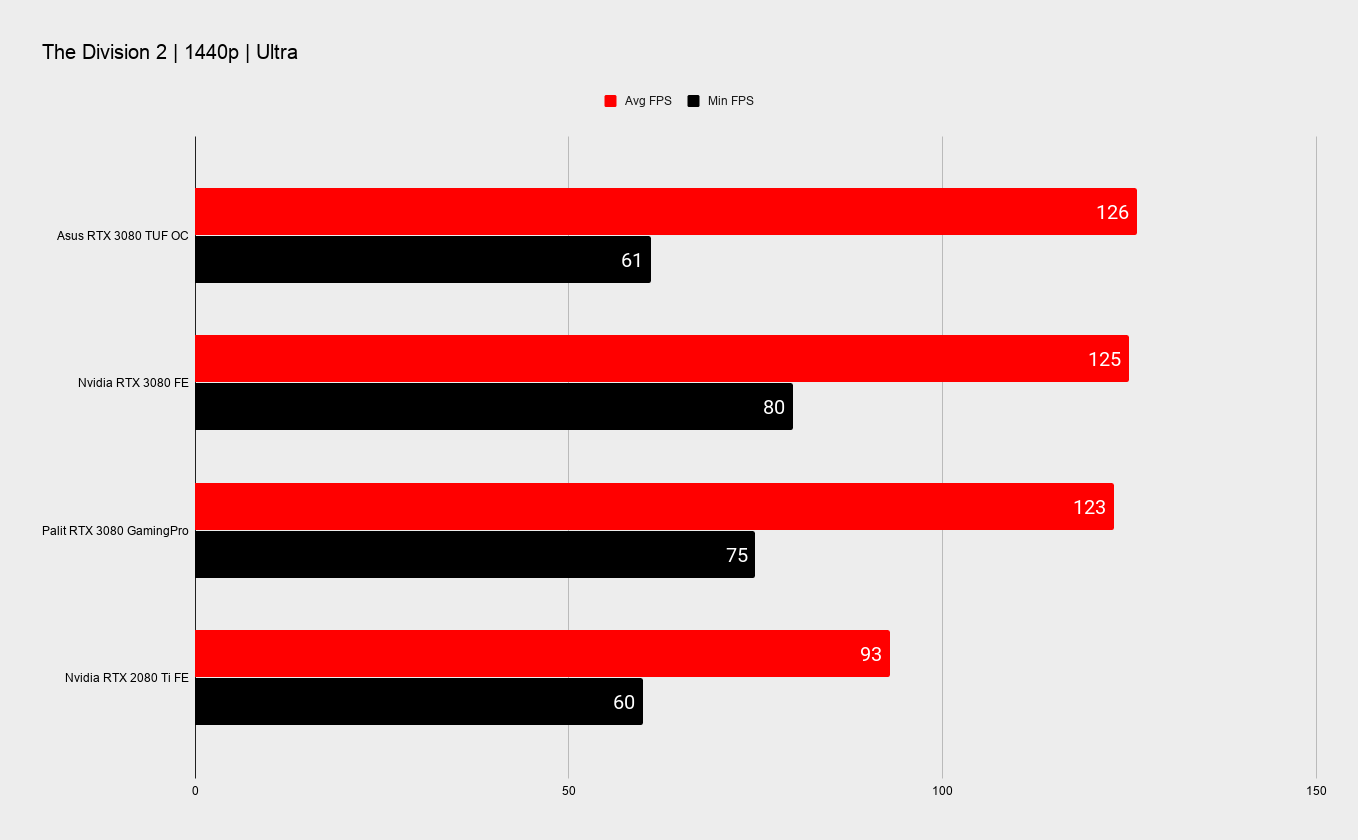
1440p gaming performance
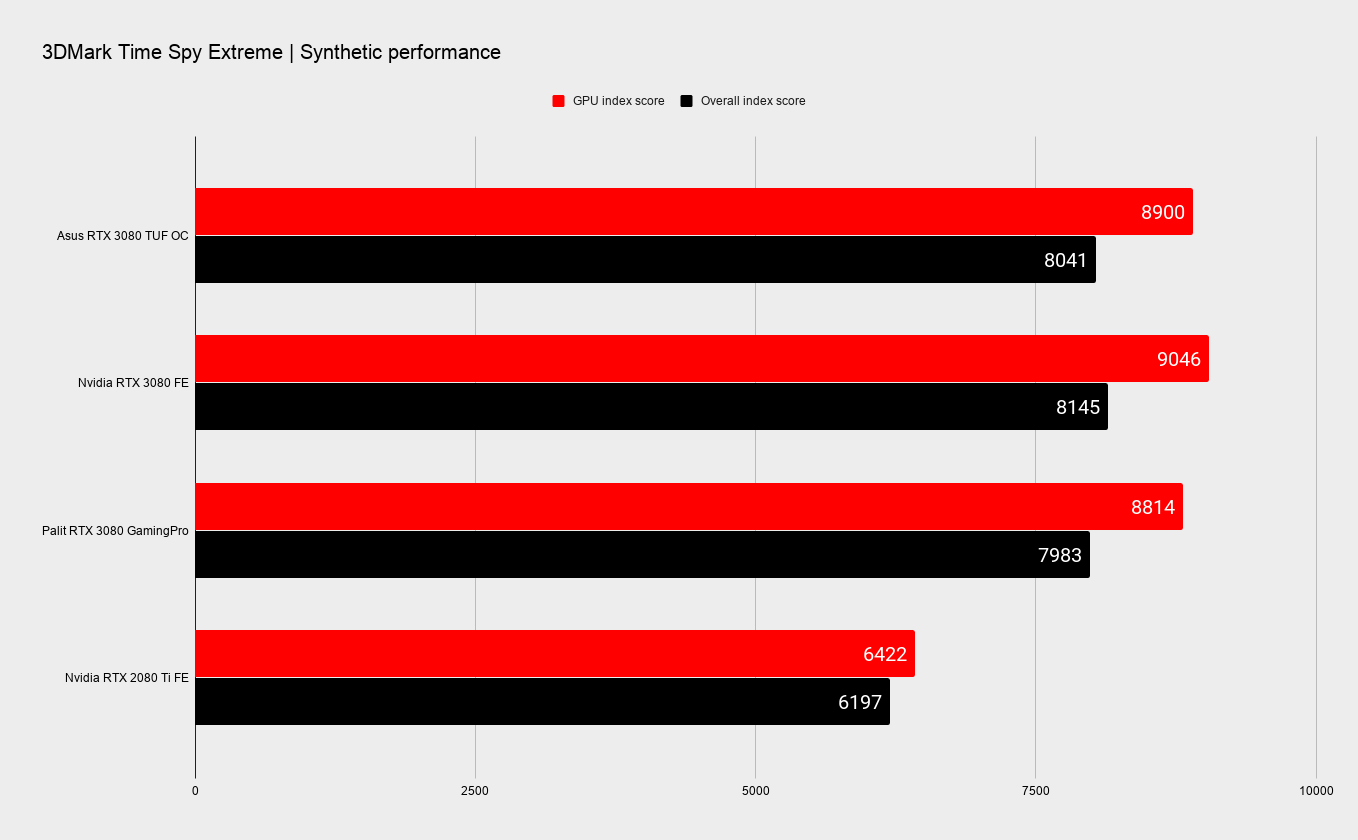
4K gaming performance
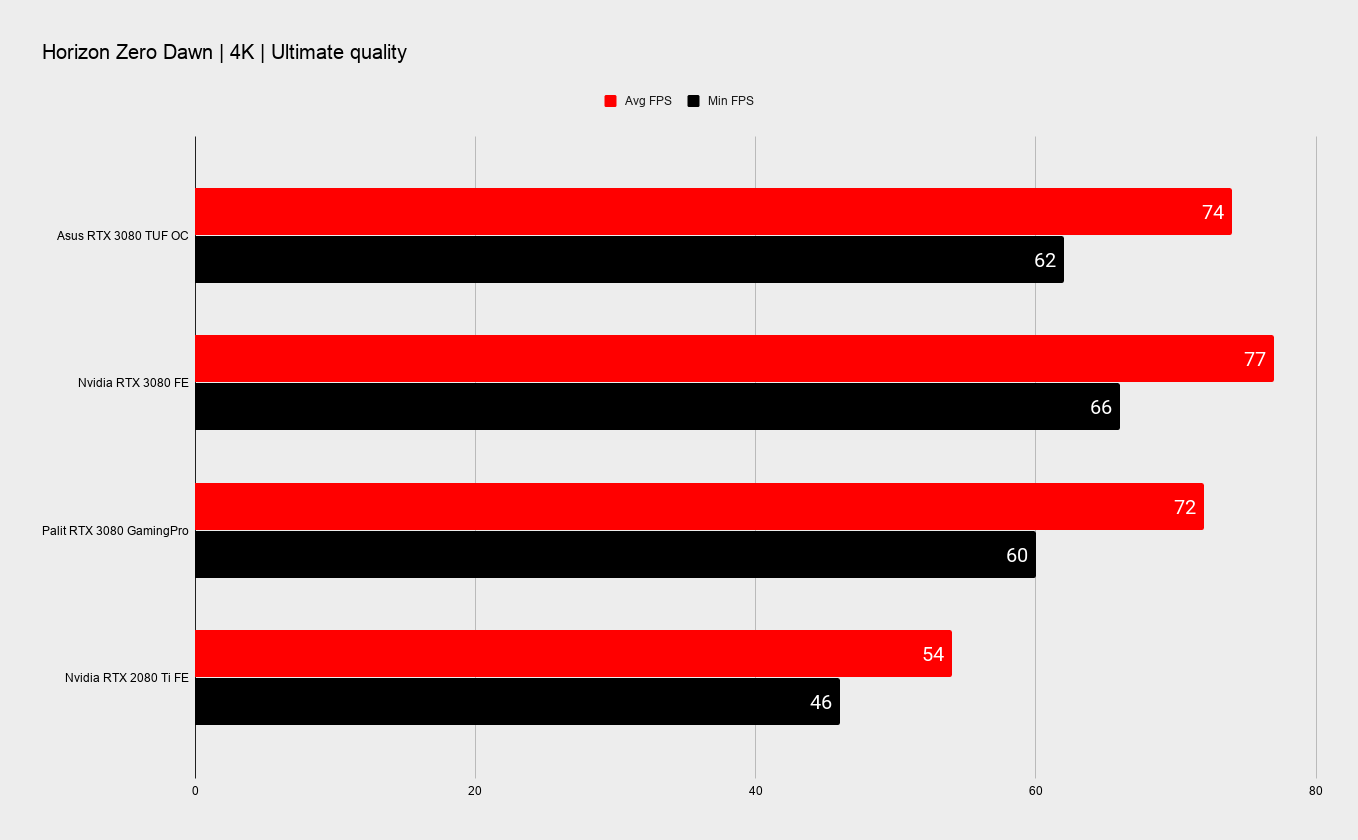
4K gaming performance
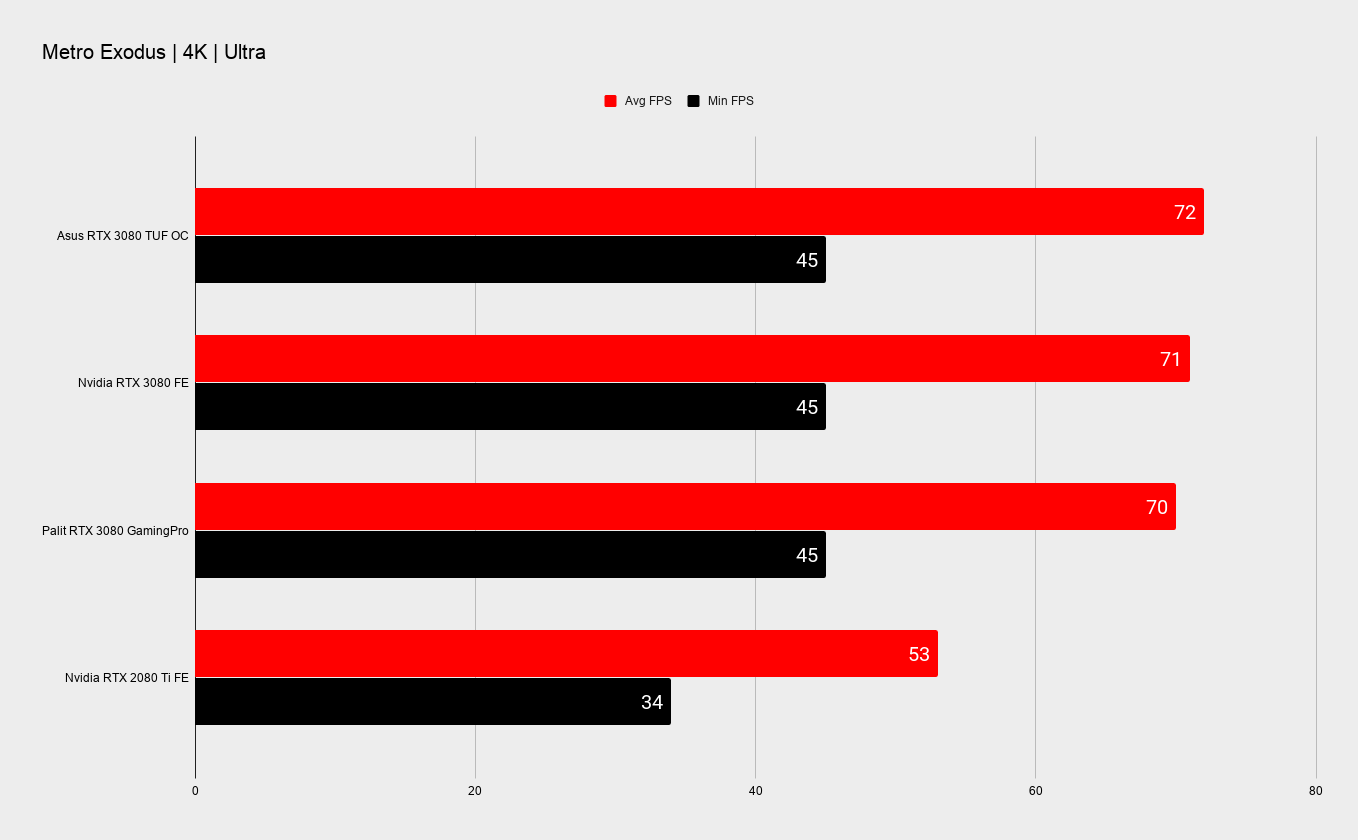
4K gaming performance
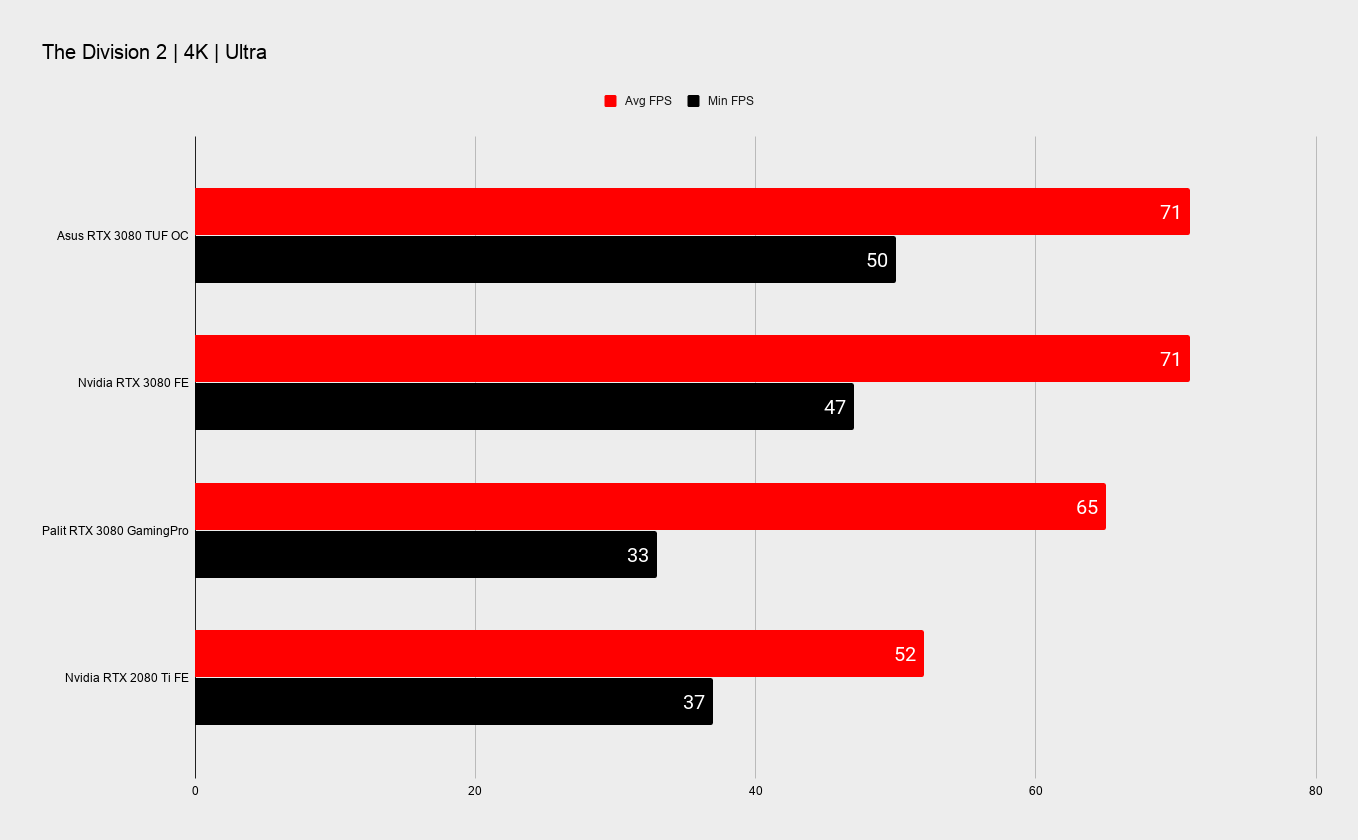
4K gaming performance
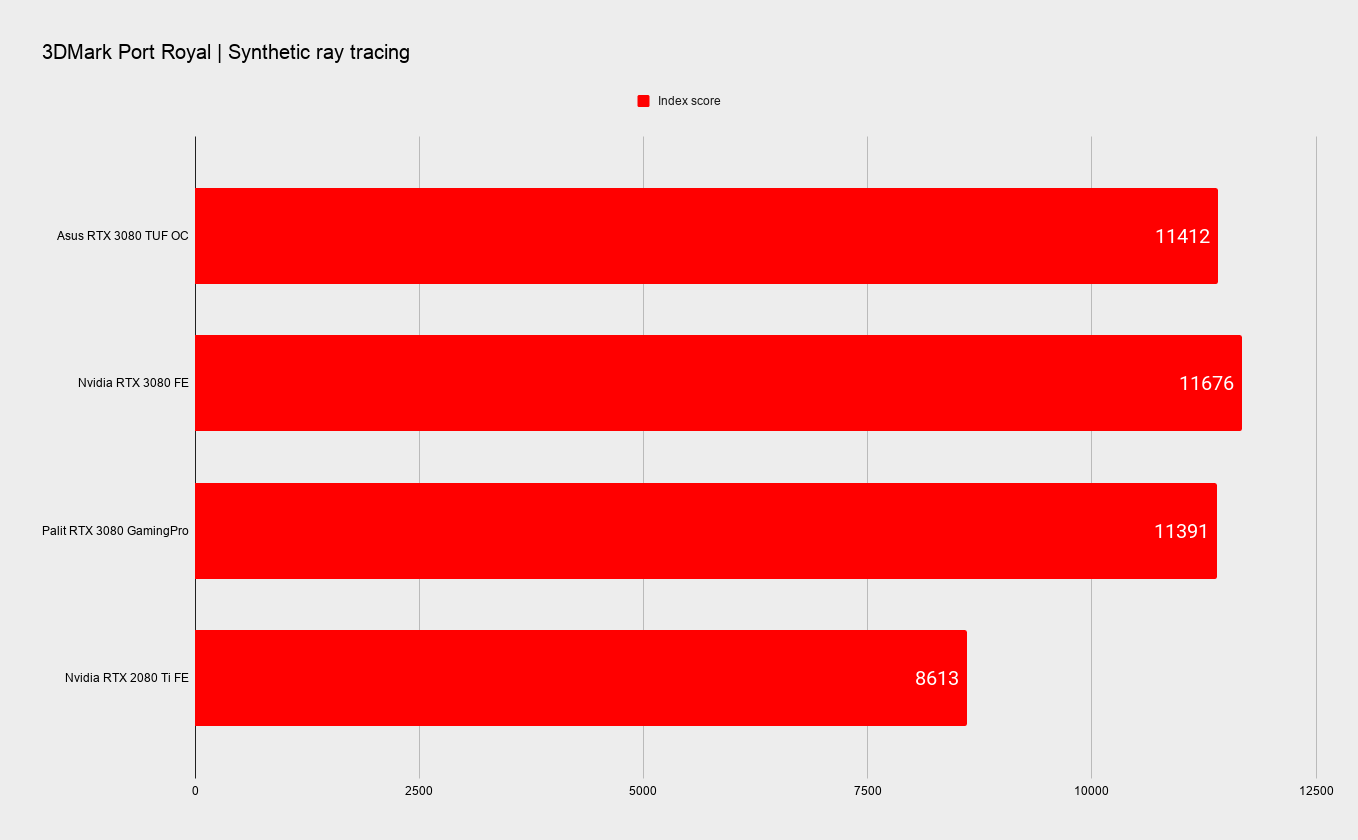
Ray tracing performance

Ray tracing performance
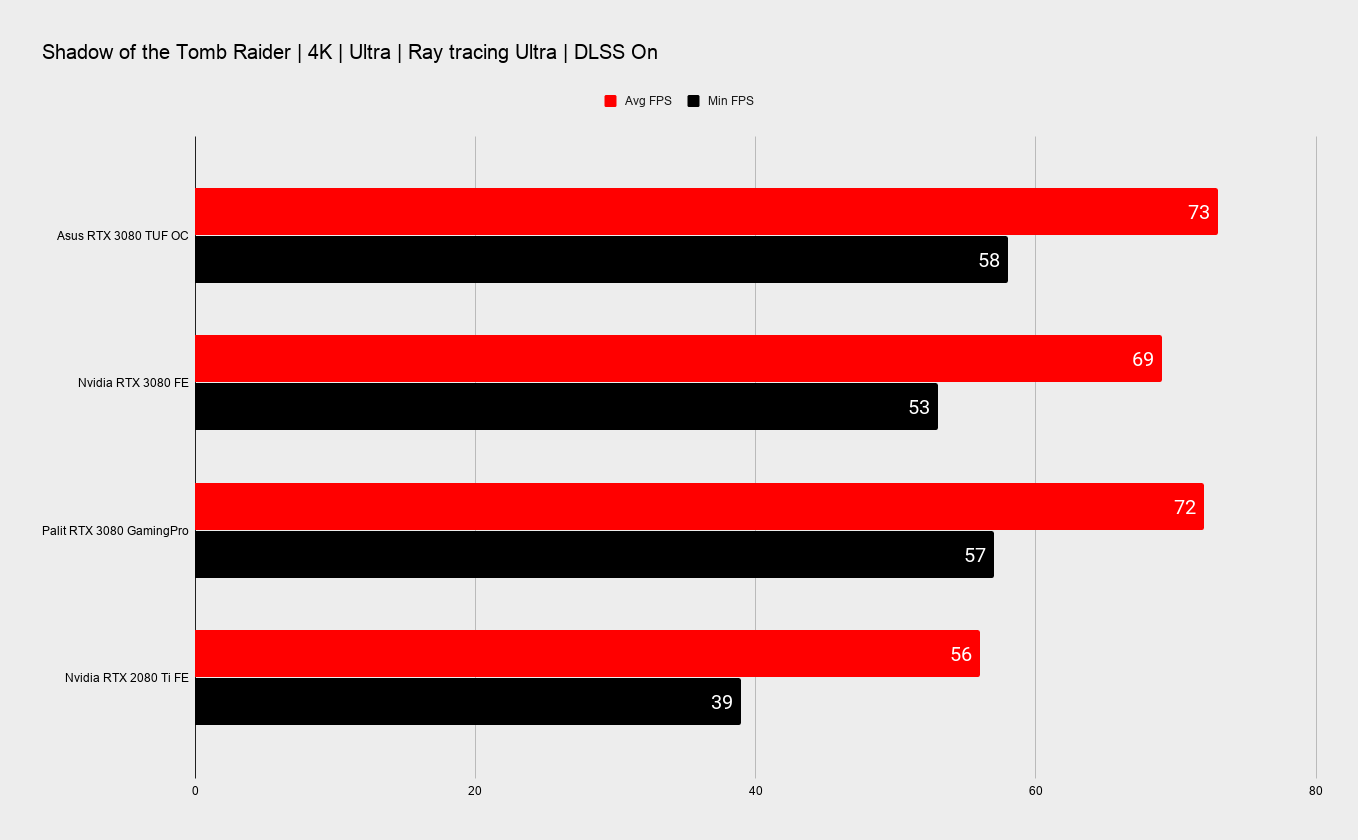
Ray tracing performance

Ray tracing performance
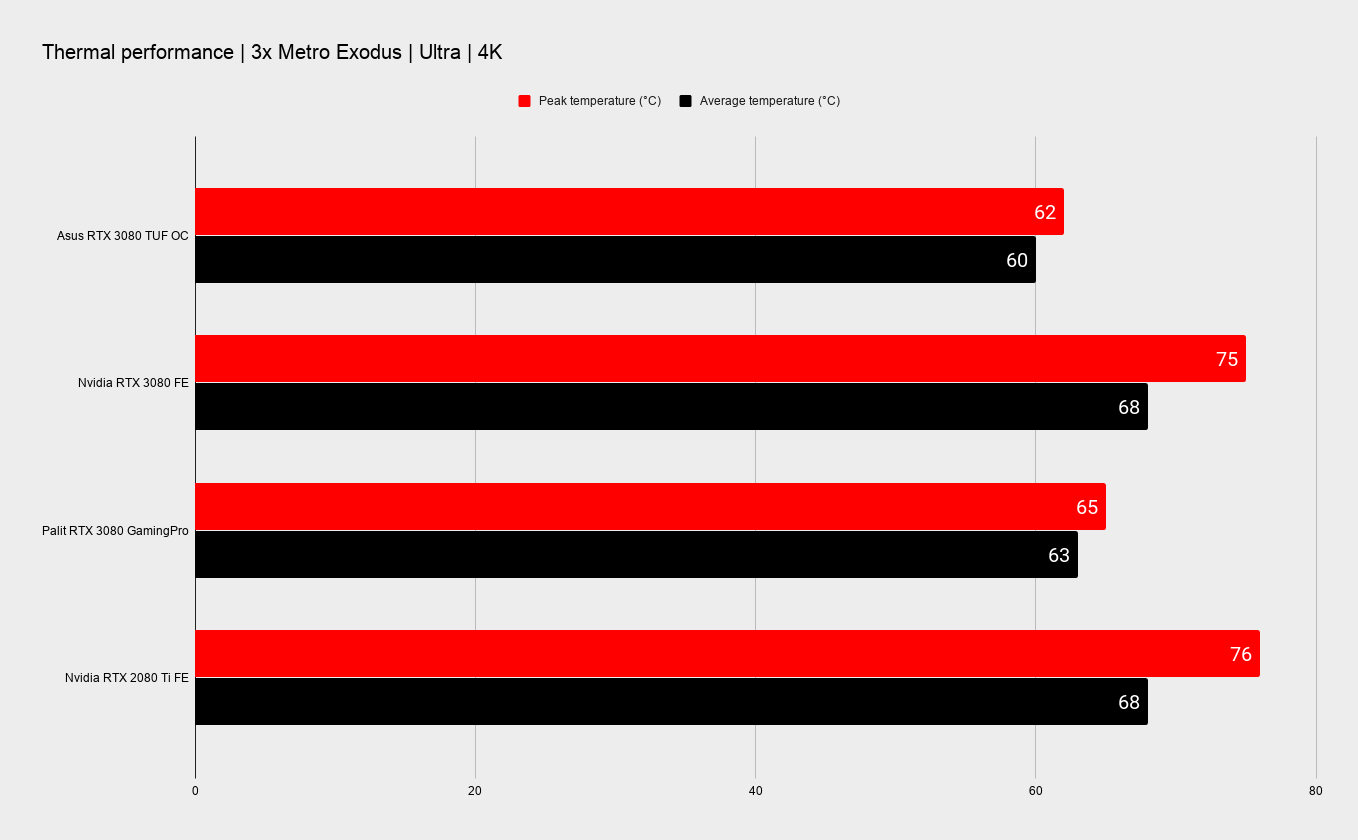
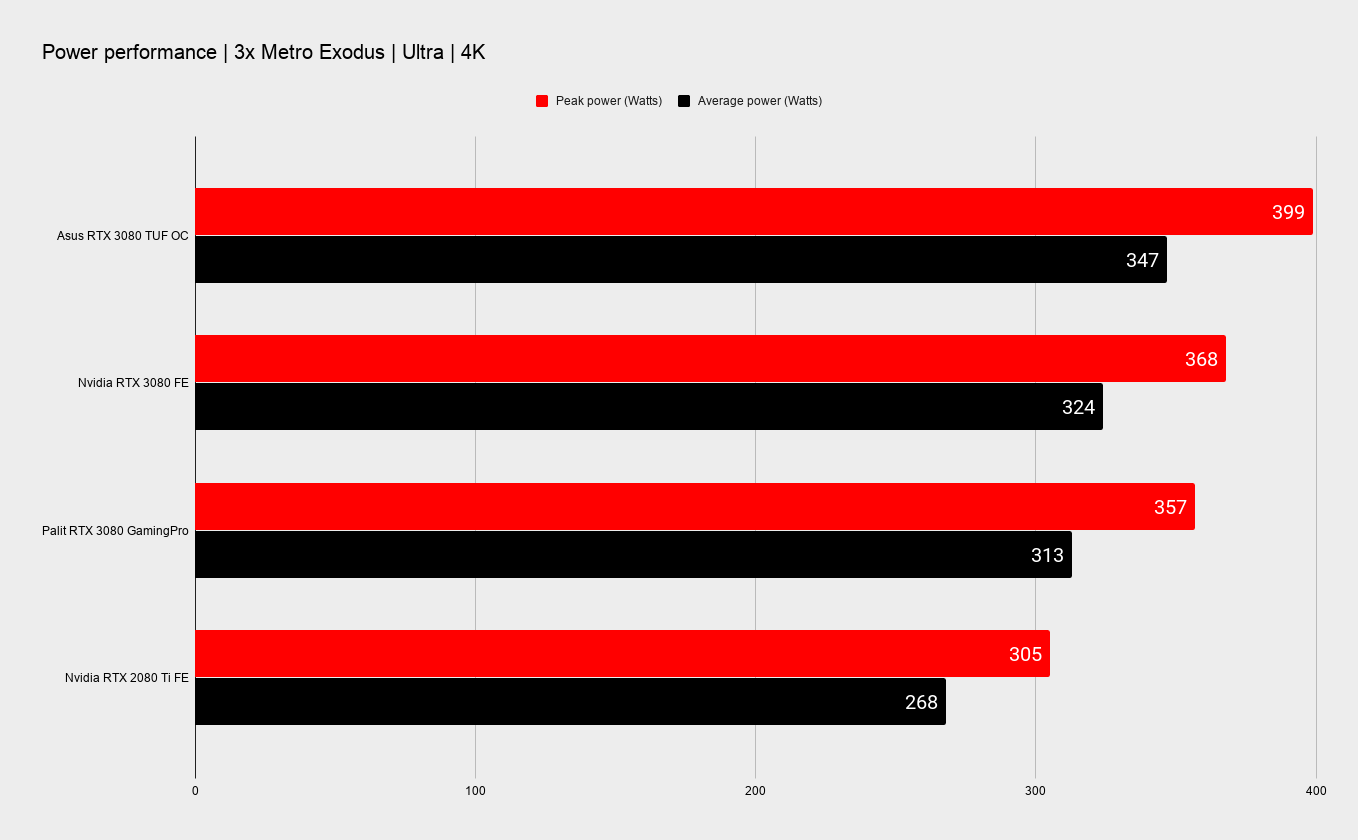
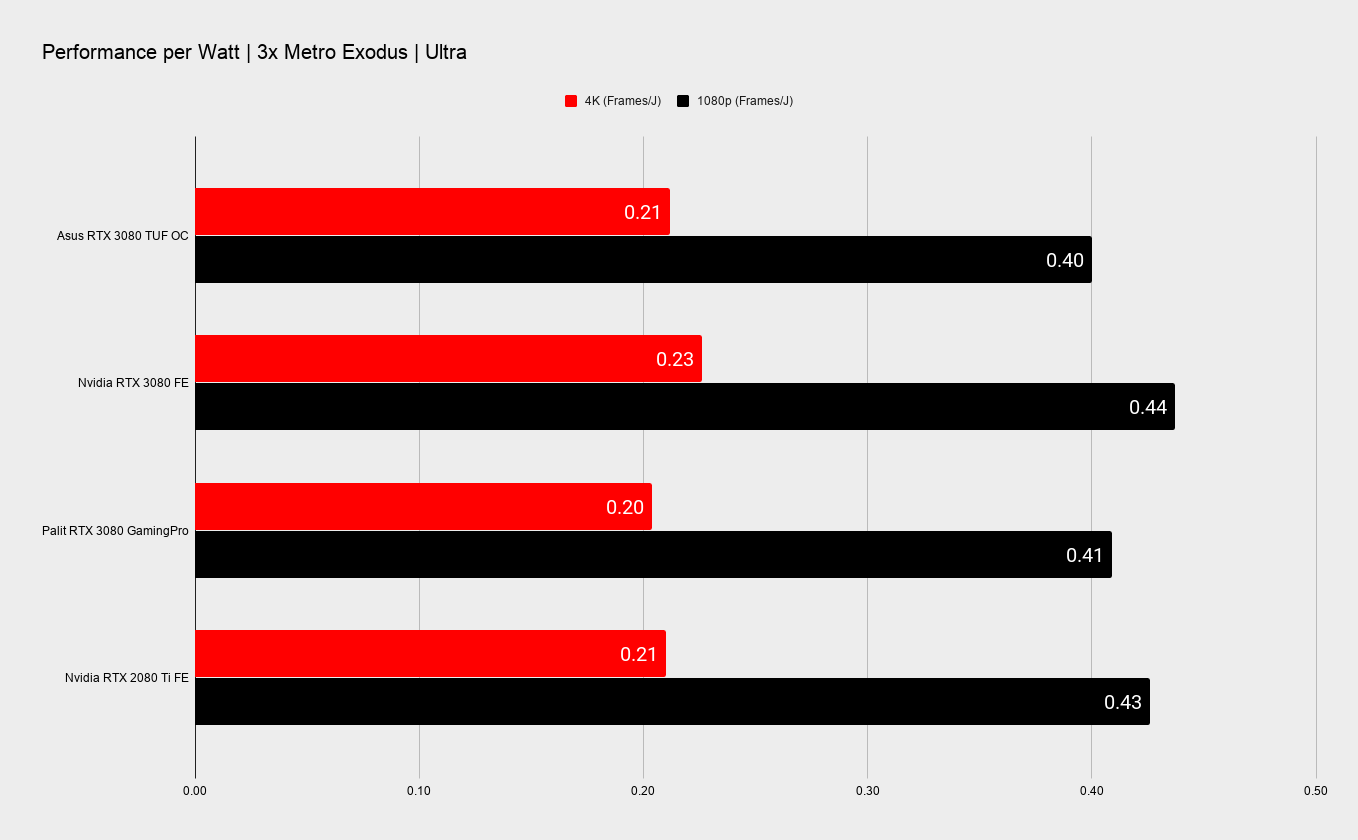
CPU - Intel Core i7 10700K
Motherboard - MSI MPG Z490 Gaming Carbon WiFi
RAM - Corsair Vengeance RGB Pro @ 3,200MHz
CPU cooler - Corsair H100i RGB Pro XT
PSU - NZXT 850W
Chassis - DimasTech Mini V2
The Asus RTX 3080 is cooler, higher clocked, and sometimes delivers higher gaming performance in our suite of benchmarks. Yet, I'm still Team Founders Edition when it comes to the RTX 3080. There are some games, and some resolutions, where the FE card offers slightly higher frame rates, and some where the TUF Gaming RTX 3080 takes the win. But often it's only by a margin that can almost be explained away as accepted variance within testing.
How is that possible, you may ask? Well, mostly it's down to the engineering quality of the FE, and not about the performance of the Asus card itself. Nvidia's own RTX 3080 has a custom PCB design that isn't going to find itself used in any third-party card—this contains the green team's special sauce, and it ain't sharing. Asus has made it's own custom board for this card, and it's a big ol' boi. In fact none of the RTX 3080 cards I've seen so far have had a similarly laid out PCB, which is going to make it difficult for folk like EKWB trying to create widely compatible water blocks.
But the FE's bespoke design means that, despite having a boost clock of just 1,710MHz, it actually clocks in around 1,817MHz on average in my long run testing. Thanks to the beefier cooling, and higher initial clock speed of the Asus RTX 3080 it does still have a frequency lead, but I was only seeing it averaging 1,839MHz across a long Metro Exodus 4K test run. And that explains the similar frame rate levels despite it being an overclocked card.
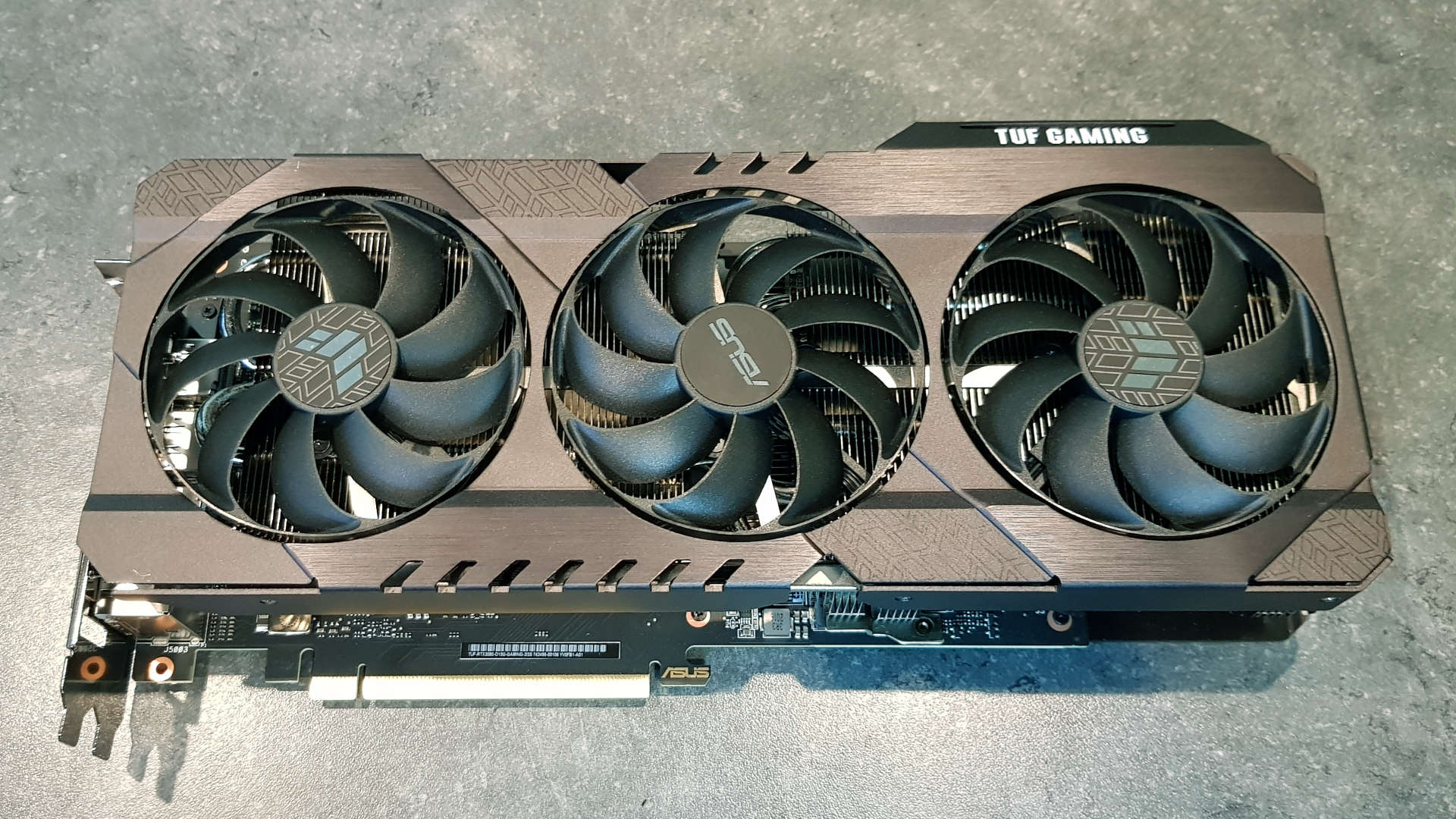
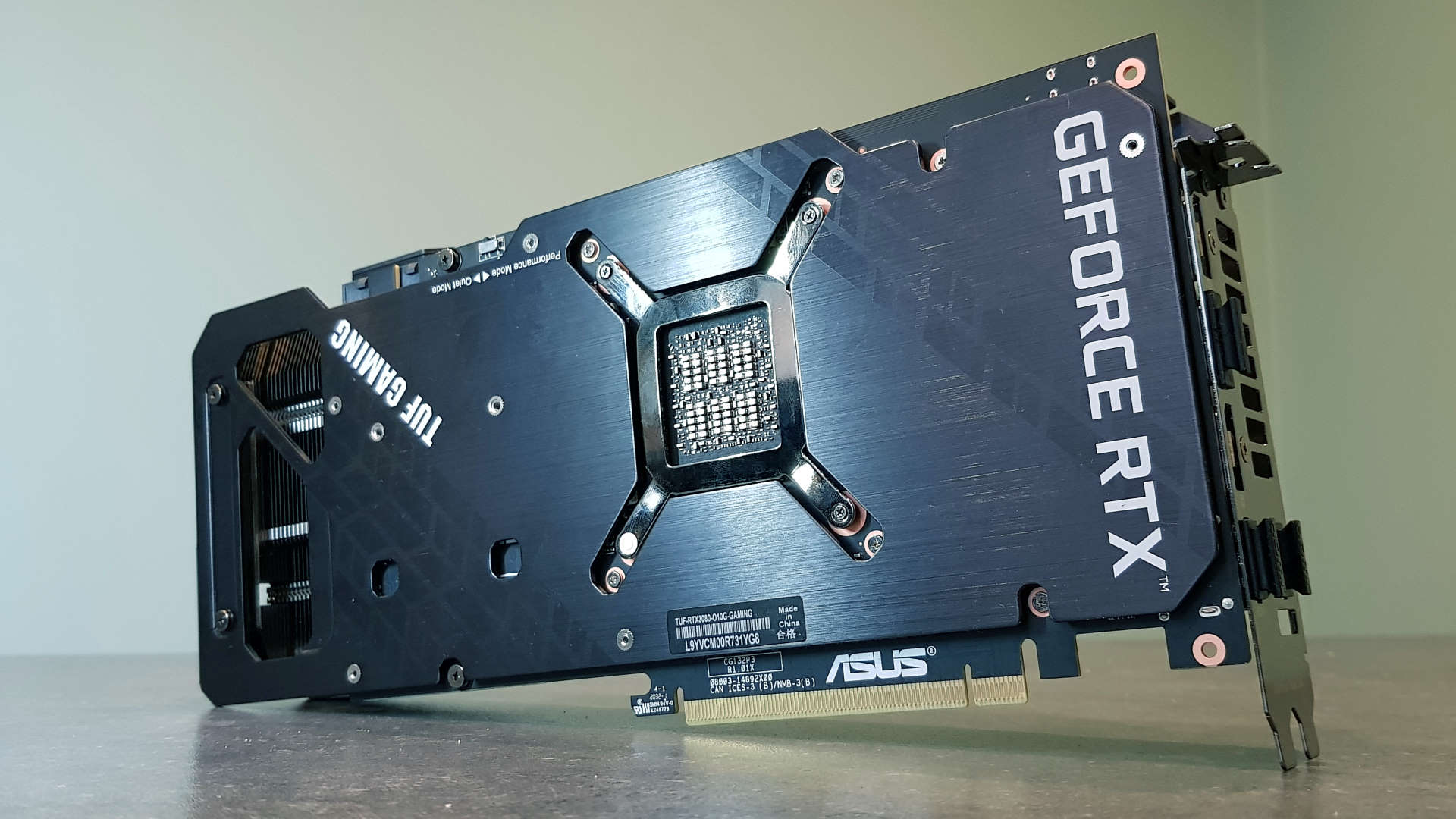
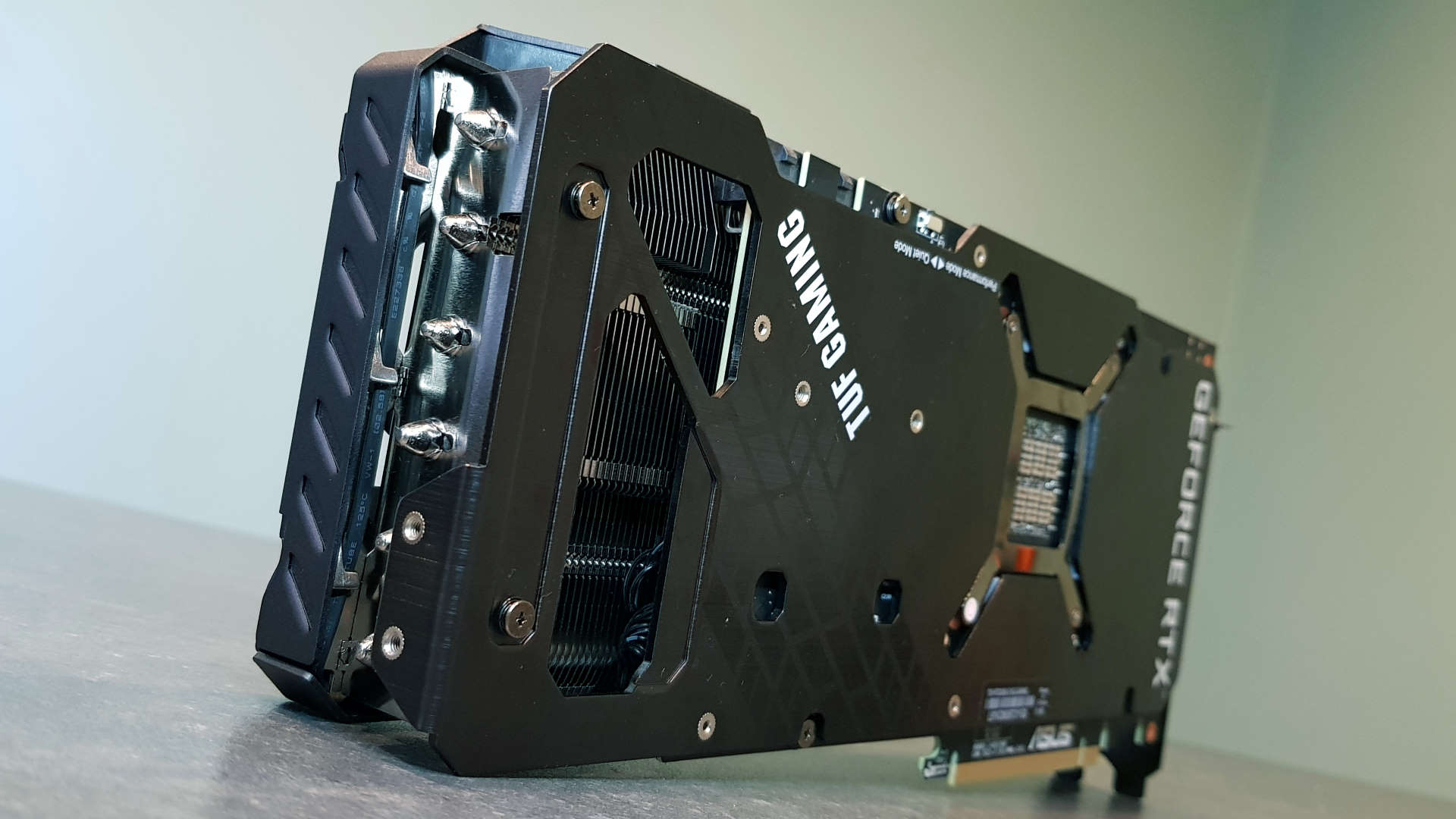
Where the efficacy of the Nvidia RTX 3080 Founders Edition design really shows is in the comparative power draw. At its peak the FE sure is thirsty, demanding 368W and 324W on average. The Asus card, however, draws 399W at peak and 347W on average, which is a lot, and really pushes down its perf/W ratings.
When you're talking about a high-end discrete graphics card, however, you're not exactly looking at the greenest gaming PC setup in the first place. I'd wager few people really worry overmuch about the amount of power their GPU draws when they're getting this sort of performance.
And the RTX 3080, in whatever guise, is still the best graphics card around today. It's certainly not cheap, or even vaguely affordable, but again I have to look back at the relative performance it offers against the $1,200 RTX 2080 Ti from the last generation. The RTX 3080 is way faster, and way cheaper. And against the similarly priced RTX 2080 Super the delta only grows.
So, while the Asus TUF Gaming RTX 3080 OC Edition is not going to sway me away from recommending you wait 'til the Founders Edition comes back in stock, you absolutely won't be missing out picking this beefy card instead. You just won't be gaining anything for with that OC Edition premium.
The Asus RTX 3080 is a great card, because the reference RTX 3080 is a great card, but also because of its stellar cooling design. Just that factory OC premium doesn't buy you much besides.

Dave has been gaming since the days of Zaxxon and Lady Bug on the Colecovision, and code books for the Commodore Vic 20 (Death Race 2000!). He built his first gaming PC at the tender age of 16, and finally finished bug-fixing the Cyrix-based system around a year later. When he dropped it out of the window. He first started writing for Official PlayStation Magazine and Xbox World many decades ago, then moved onto PC Format full-time, then PC Gamer, TechRadar, and T3 among others. Now he's back, writing about the nightmarish graphics card market, CPUs with more cores than sense, gaming laptops hotter than the sun, and SSDs more capacious than a Cybertruck.
